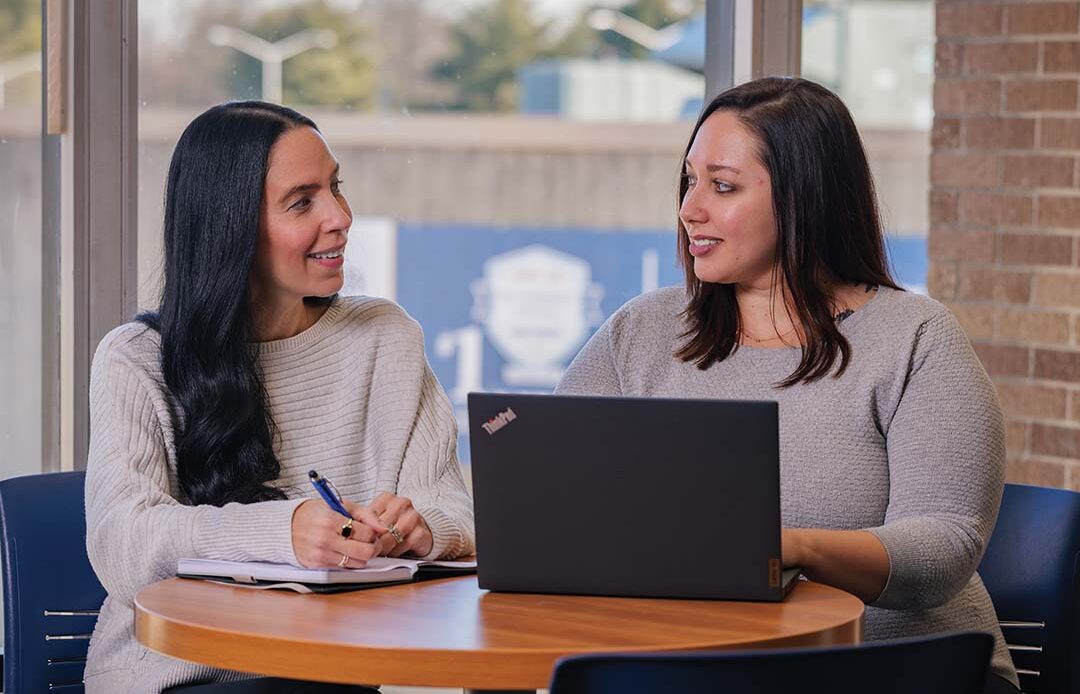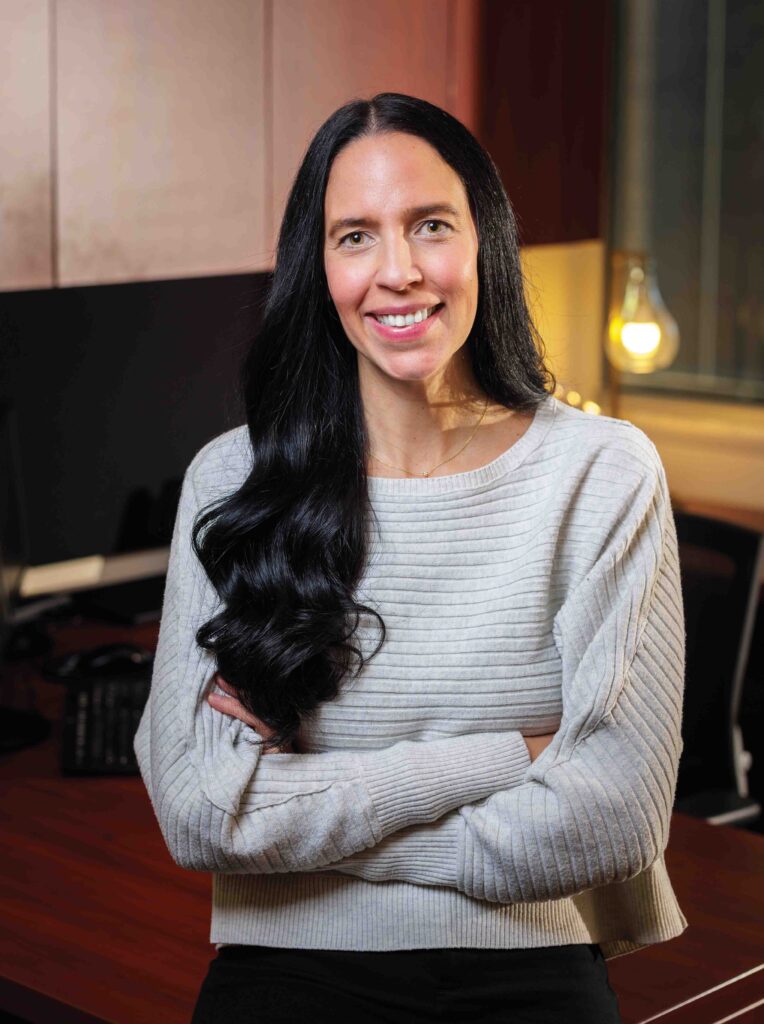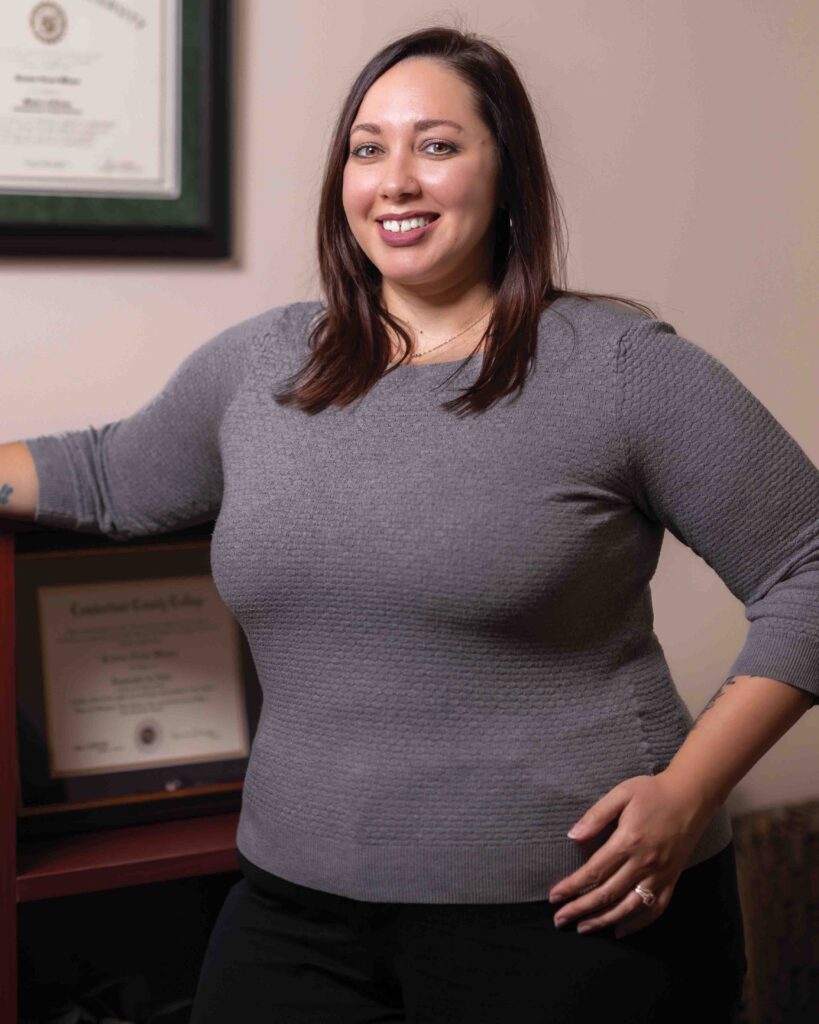
Sometimes, the stars just align. That seems to be so in the case of Dr. Diane Mussoline and Dr. Kristen Wilson. The two mental health professionals arrived on the Rowan College of South Jersey (RCSJ) campus in Sewell about a year apart — Dr. Wilson in 2017 and Dr. Mussoline in 2018. Neither had earned a doctorate at the time, but that would soon change.
The New Jersey natives quickly became colleagues and best friends. As they exchanged ideas, they realized they shared a vision for a campus wellness center.
“We wanted it to be like an open-for-all hub where students can feel holistically supported,” says Dr. Mussoline. What’s more, they wanted the center to be as much about prevention as it would be about treatment.
Both were planning to pursue doctoral degrees, and that’s when Dr. Mussoline came across Wilmington University’s Doctor of Social Science in Prevention Science program. She shared her discovery with Dr. Wilson, who had earned a master’s in Administration of Human Services at WilmU in 2015.
“They taught me skills I didn’t know, like grant writing, budget preparation, and things like that,” says Dr. Wilson. “It was a no-brainer to get my doctorate at Wilmington.”
They were especially pleased that the doctoral program dovetailed nicely with their vision for the RCSJ’s wellness center. Says Dr. Wilson: “The mental sciences world is focused on treatment, and the idea that we could prevent some of these things resonated with us.”
Encouraged by RCSJ’s President, Dr. Frederick Keating — who earned his doctorate in Organizational Leadership from WilmU — they enrolled in the program in 2020.
“Kristen and I were in the same cohort,” says Dr. Mussoline. “We decided to pursue it as kind of a duo.”
Then, once again, the stars aligned. “Right around the time we were finishing our doctorate, this opportunity came to us to restructure the previous counseling and wellness center,” Dr. Mussoline says.
“And through what we learned in our doctoral program, we created the Center for Wellness and Support, which has been a wonderful gift and journey to do together. It was a collaborative approach from the top down, but we were kind of the main players.”
She explains that the two sought to create not only a wellness hub on campus but a culture of wellness.
“We wanted to allow students to be successful academically and emotionally — without material hardship,” she says. “Kristen concentrated on the basic needs and securities side, whereas I was more on the mental health side. We were the direct line for them to get whatever level of care and help was appropriate.”
The division of responsibilities reflects the paths the two took to arrive at RCSJ.

Dr. Diane Mussoline
Dr. Wilson’s academic journey got off to a bit of a slow start. A 2005 graduate of Millville High School, she eventually earned an associate degree from what was then Cumberland County College and is now the Cumberland Campus of RCSJ.
It was, she laughs, “a storied journey” to get that first degree. “It took me seven years because of life just happening,” she says. She took some time off and worked various jobs, including server and bartender.
One of those jobs was at a drug and alcohol rehab facility. “That’s when I decided to major in Psychology,” she says.
And she did just that, earning an associate degree in 2012. Then, it was full speed ahead. She immediately enrolled at Temple University and received her bachelor’s in Psychology in 2014, followed by a master’s at WilmU a year later.
After Temple, she gained valuable experience while working for SERV — Services Empowering Rights of Victims — which provides sexual violence services in three southern New Jersey counties.
“That’s where I fell in love with the idea of prevention science,” Dr. Wilson says. “I was a sexual-violence prevention educator, working with youth on media literacy.”
She talked to middle schoolers about how movies, television, commercials, print ads, posters, and other media can influence behavior — usually subtly and often negatively. “We looked at the subtext of what some of those things mean — how do certain movies promote rape culture, for instance,” she says. “We tried to teach young folks how to distinguish between movies and reality.”
She found a challenging audience at the middle schools and Boys & Girls Clubs of Gloucester County. She says of the grant-funded project, which lasted just over a year, “Working with middle schoolers really prepares you for other hard audiences. Middle schoolers, man, they don’t give you a break. But I loved doing the work.”
Dr. Mussoline’s academic trajectory was more conventional. After graduating from Haddonfield High School in 2003, she enrolled at James Madison University in Virginia, majoring in Interdisciplinary Liberal Studies. She stayed at the school for a fifth year to earn a master’s in Elementary Education in 2008.

Dr. Kristen Wilson
Returning to New Jersey, she taught students with disabilities in Sewell for six years. In 2012, she enrolled in night classes at The College of New Jersey in Ewing, and two years later got an Educational Specialist degree in Marriage and Family Therapy/Counseling.
The degree triggered a pro-fessional change of direction for her. “I left the teaching world after I got my Ed.S. in Family Therapy and started doing work in some agencies,” she says. She was a mental health therapist for the Moorestown Visiting Nurse Association, then served as a habilitation counselor at Rutgers University for almost three years before joining RCSJ.
Dr. Mussoline is the school’s executive director of Behavioral Sciences, and Dr. Wilson is director of Behavioral Sciences. Together, they run two wellness centers, one on the main campus and another on the Cumberland County branch campus.
They generally split responsibilities based on their professional experiences: Dr. Wilson concentrates on students’ basic needs and security, while Dr. Mussoline focuses more on mental health issues. Neither provides direct counseling; rather, they conduct initial triage to determine students’ presenting needs and the resources that are available to help them.
“Then we assist with that linkage to the appropriate level of care,” says Dr. Mussoline, “and we do ongoing case management with them to ensure that the support services they’re getting are benefiting them.”
She says that the residue of the pandemic is still apparent among college students. “We saw an increase in mental health-related challenges then,” she says. “Specifically, a lot of depression, anxiety. The social isolation really impacted students’ ability to socialize. Physical activity decreased, and that upended the typical college experience and influenced a lot of coping strategies, like alcohol and drugs. So, there have been a lot of compounding effects due to the pandemic.”
Economic needs are obstacles for many RCSJ students, says Dr. Wilson. “We’re dealing with many first-generation college students and
a lot who are caring for dependents. We have a lot of single moms. Infla-tion is hitting them especially hard. We’re seeing a lot of food insecurity and housing insecurity. Rents are skyrocketing; transportation is an issue.”
The students don’t have time, she says, to worry about issues outside their world, such as politics, climate change, or war in the Middle East.
“We wanted to allow students to be successful academically and emotionally — without material hardship…. We were the direct line for them to get whatever level of care and help was appropriate.”
— Dr. Diane Mussoline
“Our students are just trying to get through the day. They’re concerned with getting to class, doing homework, going to work, picking up their kids, and getting dinner on the table. All that causes stress and mental health issues.”
“I can relate,” she adds. “I was a low-income community college student, and I worked full-time, sometimes two jobs. It’s not easy.”
Thanks to the school’s partnerships with Acenda Integrated Health and Uwill, a student mental health and wellness online platform, the Center for Wellness and Support can act as a referral hub and offer students extensive resources and services, many of which are free.
Dr. Keating has high praise for his fellow WilmU alumni. “These ladies are exceptional in their work and ability to put together such a project on two campuses, especially after coming out of the post-pandemic arena,” he says. “They’ve led the charge from the beginning. They’re meeting students all day, every day, doing referrals and follow-ups. The wellness center has been very successful.”
“It’s satisfying work,” says Dr. Mussoline. “It’s nice to see students on the other end of their challenges, where they’re succeeding and where supports that we led them to benefit them and give them a fresh perspective on life because now they’re not navigating some of these challenges on their own. It gives you hope that things can get better. Of course, sometimes it’s hard when they’re unwilling to access the support. So, you see both sides of that.”
Says Dr. Wilson: “I absolutely love my work, helping them to navigate referrals, etc., and learn what the gaps are, and then, OK, how do we strategically figure out how to meet those needs? It’s great.”
The two colleagues have adjoining offices, and when their doors open, they often talk back and forth.
And the conversation isn’t always about work.
“We’ve built this wonderful friendship,” says Dr. Mussoline.
“Over the years of working together, we’ve experienced births, deaths, the pandemic, grad school, and major work changes together,” says Dr. Wilson. “I’m very grateful for our friendship, in and outside work.”
Stars, colleagues, offices: They’re all aligned on the Rowan College of South Jersey campus.
— Bob Yearick

